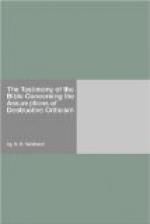Our Lord further certifies to the historicity of the book of Jonah by his reference to the great prophet’s preaching. The critic’s objection is thus stated: “Can we conceive of a heathen city being converted by an obscure foreign prophet?”
Of course, the objection to the record of that mighty moral movement comes from those who have counted God out of Jonah’s preaching. If they can eliminate the divine power from that event, they can easily hand the whole record over to what they are pleased to call the “folk lore of the Bible.” Here, as ever, the critic must rid the Scriptures of the supernatural.
But our Savior knew that “power belongeth unto God” (Psa. lxii. 11), and he put on record the repentance of the Ninevites, saying, “The men of Nineveh shall rise up in judgment with this generation and condemn it, because they repented at the preaching of Jonah.” (Matt. xii. 41.) But if the book is not history, our Lord’s statement is false, for he says the Ninevites did repent.
There is no rational possibility of denying our Lord’s positive statement without impeaching his veracity.
His words authorize the following conclusions:
I. There was a prophet whose name was Jonah, as is stated in 2 Kings xiv. 25. He was not a myth or figment, but a prophet whose personality is authenticated by Christ himself.
2. There was a city of Nineveh. The skepticism of other days denied the existence of Nineveh. So completely was the prophecy concerning the destruction of Nineveh fulfilled that the enemies of God’s Word refused to believe that the city had ever existed, until the excavations of the last century revealed the hidden ruins. But the word of God was true, and in God’s time Nineveh was revealed.
3. God sent this same prophet Jonah to Nineveh to preach. Christ tells us what took place under “the preaching of Jonah.” It terminated in a great awakening and reformation for:
4. “The men of Nineveh ... repented at the preaching of Jonah.”




